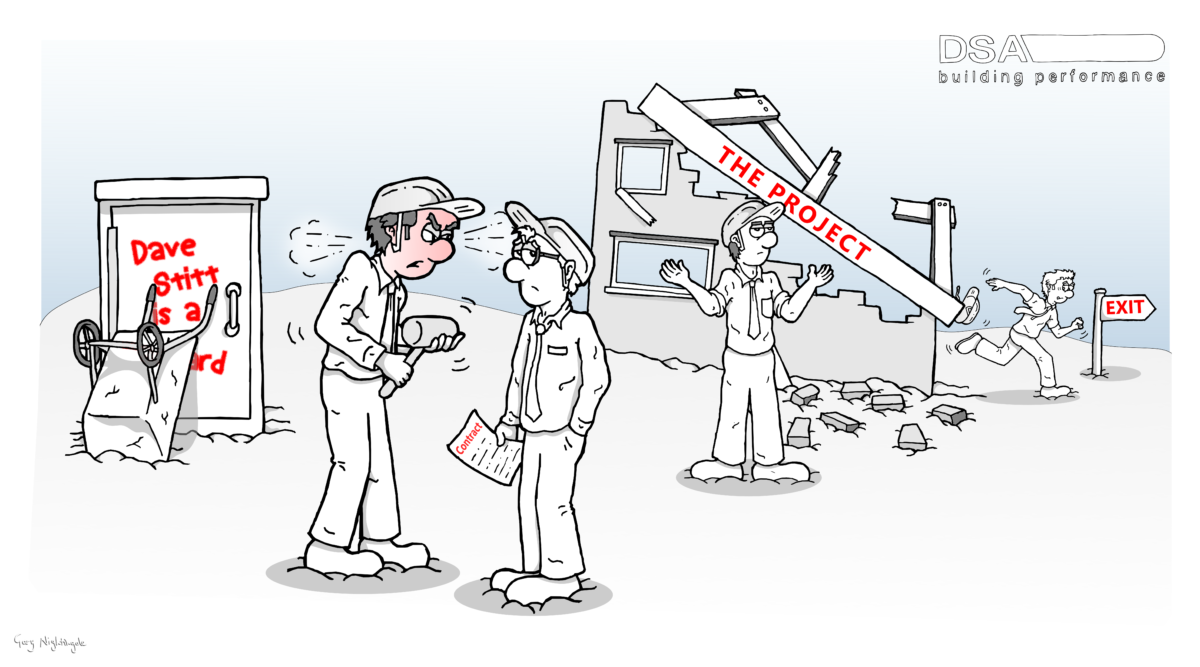How to kill off talent

It’s time for me to set out what I believe young construction professionals will get out of the course I’m launching with the CIOB in March, called Coach for Results.
It’ll teach them the basic techniques of coaching, which they can use to be more effective in their job and to become leaders.
Why would coaching techniques do that?
Because construction projects are complex entities where technical competence matters, but where people and relationships matter more.
Coaching techniques allow you to activate people around you by helping them to own and develop their capability.
Construction really needs this. I’ll explain why.
Things go wrong
On paper, projects shouldn’t go wrong. They’re planned and scheduled in detail, and all the roles are assigned to competent parties. In theory, everyone knows what they’re supposed to do and when.
But they do go wrong, all the time, because unexpected things occur, mistakes get made, weather happens, information gets corrupted, priorities diverge, there are design changes and errors, interpretations differ, and wills and agendas clash.
When some or all of these things happen, the contract can’t really help. It’s usually there in the background as a coercive instrument, but by the time you’ve resorted to it in anger, the project is already hurting.
Project activism
To keep a project on track you have to initiate action, all the time.
You must spot danger on the horizon and initiate action to head it off.
You must spot chances to save time and money and initiate action to seize on them as extra insurance for success at the end.
And when things do go wrong, you must initiate action quickly to fix the problem and recover what’s been lost.
Good project leaders are activists. Do this and the contract can do its job.
But all this action: it’s not you running around doing stuff. You can’t. Instead, it’s you activating the people around you to see what needs doing and to step up and do it.
How do you do that?
Fear and control don’t work
When I was in my 30s, I tried to do it with drive, push and control. Following the example of others, I would bark orders, blame, threaten, dominate and menace.
It sort of worked, but it put huge strain on me because I felt I was carrying the whole project on my shoulders. “Why am I the only one who can see what needs to be done?”, I’d moan.
It put huge strain on the people around me, too. One day I saw “Dave Stitt is a bastard!” scrawled on the toilet door, which gave me a kind of satisfaction then, but which mortifies me now.
It’s a good way to make enemies, but not a good way to lead.
I was lucky to avoid major mishaps, but how much enthusiasm, goodwill and capability – talent, in other words – did I kill off by creating fear and trying to control? How much better could the outcomes have been if I hadn’t rigidly insisted that I knew best, and if the people I was leading felt empowered, enthused, and able to share their insights?
How many people did I unwittingly chase out of the industry for good?
Spreading the power around
Coaching is the opposite approach. A coach-leader accepts that people know what they’re supposed to do, and can do it.
Then, instead of barking orders and demanding compliance, the coach-leader holds purposeful conversations with people to activate their capability, to think for themselves about how that capability can be applied amid the fluid circumstances of a project.
When people work things out for themselves, they own their accountability and things get done. They feel empowered, and their sense of engagement goes up, as does their determination and enthusiasm. When problems arise, they’ll find a solution, not wait around for you to dictate one.
Do you see what’s happening here? In my 30s I was hoarding control, which meant that results depended on me, with all my limitations.
Coaching grows capability in others and shares out accountability for results, which is a far more potent and reliable model for results.
So, using a coaching style, young professionals will stand a better chance of racking up successes, and showing others how to do it, too.


Coach for Results
Designed with young professionals in mind
Perform better in your current role, become an effective manager and over time a great leader and together we will change the construction industry.
This is what I think is in it for you, what do you think?
As a young professional you will become more effective in your job, almost straight away and increasingly so with practice.
You will build a network with like minds and make relationships that may last a career.
You will get things done more quickly, freeing you up to think in order to be even more useful.
You will help reduce misunderstandings and frustration. Under your watch, things will go more smoothly. You’ll become more influential.
You will become an agent of change and will stand out as upper management’s go-to person.
You will become better than your boss is now, and will help them become better so you both succeed.
You will get that role you are aspiring to, and the one after.
You will help change your organisation and the industry from the ground up.
It seems a lot from a ten-week course but, when you change the conversation, everything changes.
This is what I think is in it for you, but I’d love to hear from you. What would you like to get out of our Coach for Results programme?
